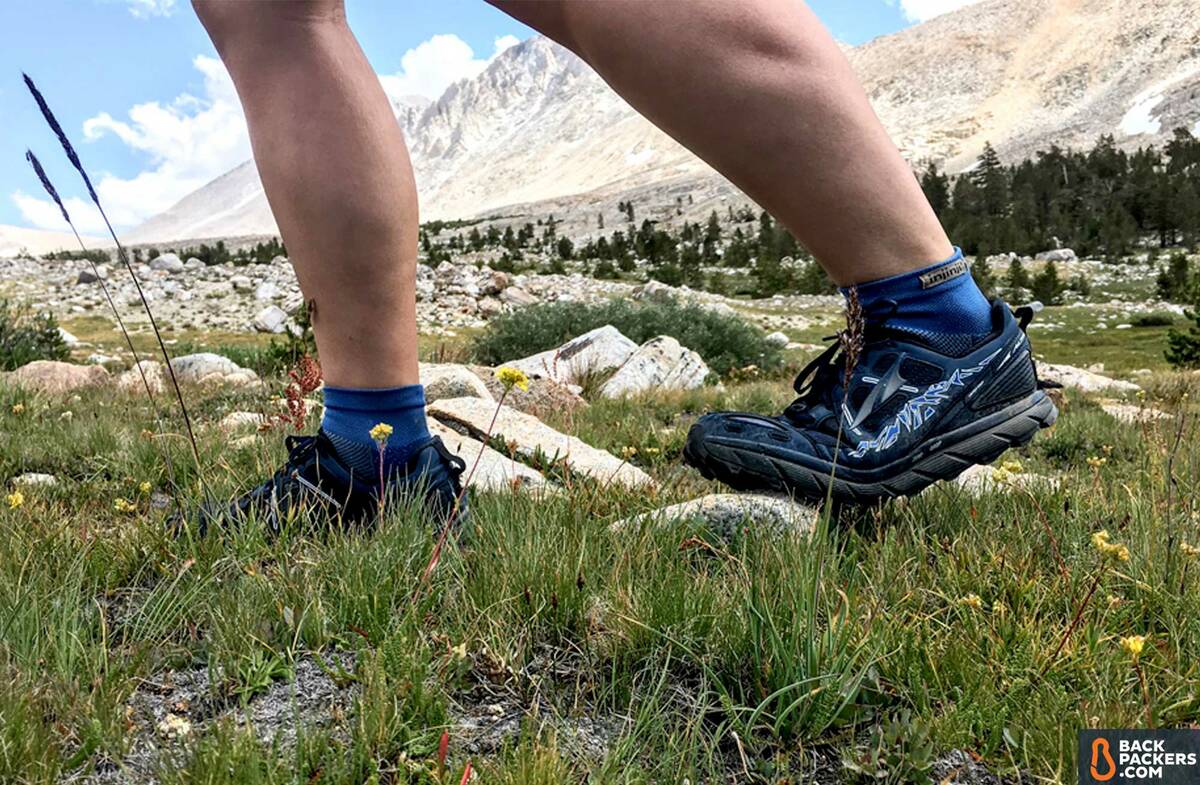Altra Lone Peak 3.5 Men's
-
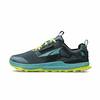
 Amazon US
Amazon US$139.99$109.94See itAmazon.com Price: $109.94 (as of 07/24/2024 13:20 PDT) Details
Product prices and availability are accurate as of the date/time indicated and are subject to change. Any price and availability information displayed on Amazon.com at the time of purchase will apply to the purchase of this product.
-

 Zappos.com$139.95See it
Zappos.com$139.95See it
Altra Lone Peak 3.5 Women's
-
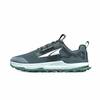
 Amazon US$134.86See it
Amazon US$134.86See itAmazon.com Price: $134.86 (as of 07/25/2024 07:35 PDT) Details
Product prices and availability are accurate as of the date/time indicated and are subject to change. Any price and availability information displayed on Amazon.com at the time of purchase will apply to the purchase of this product.
-

 Zappos.com$139.95See it
Zappos.com$139.95See it
Altra Lone Peak 3.5 Overview
While the Altra Lone Peak 3.5 is technically a trail running shoe, they’ve made their mark in the thru hiking community as a lighter alternative to the standard hiking boot. Their heavily lugged sole gives comparable traction to many boots, and the FootShape Toe box found across all Altra shoes means that your feet can fully splay, keeping you more comfortable during long days on the trail. Add in thoughtful design elements like the four point gaiter trap and the quick drying upper, and it’s no wonder the Lone Peaks have become a favorite with hikers and trail runners alike.
Altra is also known for their Zero Drop approach to shoes, which means there is no difference in cushion height between the heel and forefoot. This is loved by some, and very uncomfortable for others. For me, Zero Drop is the only way to be.
Read the full Altra Lone Peak 3.5 review below.
Altra Lone Peak 3.5 Star Rating
- Durability
- Soles
- Upper
Summary
Altra Lone Peak 3.5 is an outstanding zero drop shoe for trail runners and lightweight hikers, specifically due to its excellent construction and feature-packed design.
While we often give out awards and Picks for gear, we won’t be for shoes. After testing many shoes and finding the right fit for each member of our team, we realized that a shoe is simply too subjective to unequivocally recommend to anyone.
Our advice is to know what brands of shoe fit you generally by trying them on in store, and then look for excellent models, which we review here. Look in our specifications table to see if the shoe generally fits wide, narrow, or standard-sized feet. There are a lot of differing elements among shoes, but this is the one that matters right off the bat.
Update: Shoe models change fast, and as of 2019 the Lone Peak 4 is now the current model. The Lone Peak 4 has an updated heel cup, which our testers don’t like as much as the 3.5 (but heel place is pretty subjective). It also has new laces and a static webbing in the tongue for a tighter, firmer fit. There’s less cushion than the 3.5, and an updated StoneGuard. Shoes are very subjective (as that big disclaimer above shows), so if you try on a Lone Peak 4 and love it, by all means.
Lone Peak 3.5 Specifications
| Feature Type | Feature Specs | What This Means |
| Weight | 10.4 oz. (295 g) per shoe | About average weight for trail runners. Not the lightest, but certainly not the heaviest. |
| General Fit | Standard/Wide | The Lone Peak 3.5 generally fits standard feet, but because the toe box is so wide, it does well for wide-footed people as well. |
| Cushion | Medium | The cushion on this shoe is the high end of medium. You’ll feel plenty of squish between you and the ground. |
| Stack Height | 25 mm heel, 25 mm forefoot | Solid, medium amount of cushion throughout the shoe. |
| Heel-Toe Drop | 0 mm | Altra uses ZeroDrop, which means no change in the stack height between heel and forefoot. This takes getting used to, but some people swear by it. |
| Arch Type | Neutral (Normal Arch) | This shoe is for normal-arched people, as long as they can handle ZeroDrop. |
| Rock Plate? | Yes, Sandwiched StoneGuard | A solid rock plate is used in the Lone Peak 3.5, giving it great protection from sharp objects. |
| Lace System | Traditional, Flat Laces | The laces are flat, rather than round, and tie traditionally (with your hands). |
| Sizes Available | 7-16 for Men, 5.5-12 for Women, with half sizes | Pretty much any size for both gender. |
| Manufacturer Warranty | Return Policy | Altra does not have a stated guarantee on its shoes, but says they are expected to last 300-500 miles. If you see abnormal wear before then, get in touch for a return. |
| Retail Price | $120 | The average price of solid trail runners. |
Gear Review of the Altra Lone Peak 3.5
Origins: Easing You In
The Altra Lone Peak 3.5 trail runners arrived on my doorstep less than three days before I was scheduled to depart for a thru hike of the John Muir Trail — a 220-mile trail that winds its way through the heart of the Sierra Nevadas. Straight out of the box these shoes looked — and more importantly felt — great. It was clear from first glance that Altra had put some real work into redesigning their upper and adding a few new features.
The problem? Now I had a choice to make. Would I take my old pair of Lone Peak 3 trail runners, which I’d nicely broken in, or would I risk it all on the new 3.5, knowing that once I made my decision I’d have no way to change my mind?
In the end, I risked it all on the new shoes, and couldn’t have been happier.
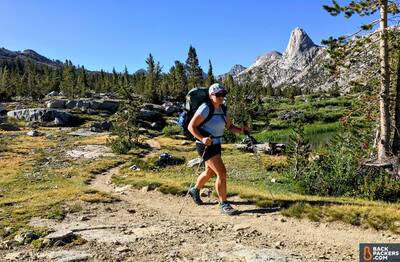
Thru hiking the John Muir Trail in Altra Lone Peak 3.5 shoes.
The first day of our hike we left the baking desert town of Lone Pine and drove to the base of Mount Whitney, where we then proceeded to immediately hike up to 13,600 feet with 40 pounds on our backs. We were taking a Northbound JMT route, and it starts with climbing to the highest point in the contiguous U.S.
During the next five days we made our way north, summiting multiple 12,000-foot granite passes, and wading through creeks that ran high from late summer snow melt. The more hikers we passed, the better I felt about my shoes. Instead of toting along camp shoes, water shoes, and trail shoes – as many of our fellow thru hikers carried — I just had the Altra Lone Peak 3.5, a single pair of shoes for crossing creeks and snow, using around camp, and hiking in all day.
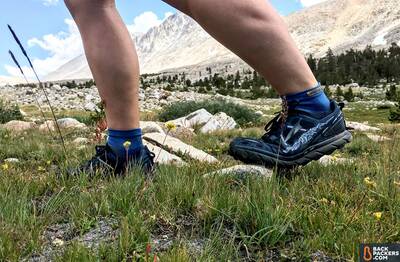
Hiking the John Muir Trail in the Altra Lone Peak 3.5.
And I never got tired of them.
Revelation: The Moment I Knew
Two weeks into our trip my boyfriend and I were sitting around the campfire with some other JMT thru hikers at Reds Meadow when the subject of foot pain and blisters came up. Some people had numerous huge blisters on both feet, some people’s feet were aching because of walking across hard granite all day, and others shared stories of hiking up passes in their water shoes because they just couldn’t stand wearing hiking boots any longer.
I sat there, sipping my drink, feeling like I’d won the shoe lottery.
The Lone Peak 3.5 had performed so well up to this point that I hadn’t really thought of them. Let me clarify — my feet felt so good after 14 days of near continuous hiking that I had completely forgotten that foot pain and blisters were central to the thru hiker experience.
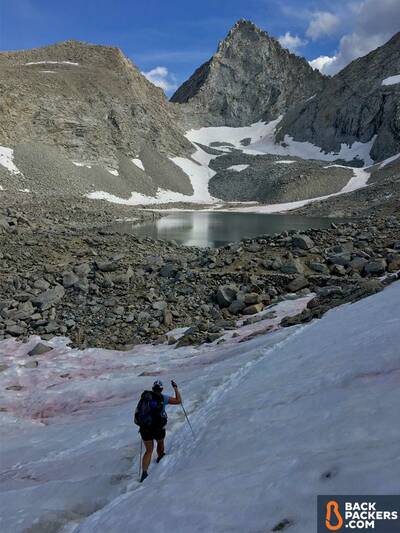
No real blisters or pain, despite trekking through pass after pass of like this.
Aside from one hotspot that developed after a long and very wet day of hiking, I’d had no issues with blisters, and the sandwiched rock guard had been stopping sharp bits of granite from stabbing my feet.
You can’t really ask for more when it comes to shoes.
Digging Deeper
The entire Altra brand is built around the core tenant that their shoes all are ZeroDrop — meaning that there is no difference in stack height between the front and back of the shoe. This is very relevant if you’ve never worn Altra’s or zero drop footwear before, as there will be some break-in period as your calf muscle and achilles tendon lengthen. Many modern running shoes and hiking boots have a 4-10 mm heel rise built into their shoes, so that’s what your body will be used to.
I think the combo of ZeroDrop and the sandwiched rock guard of the Lone Peak 3.5 were instrumental in keeping my feet happy on the trail, and gave me exactly zero foot pain.
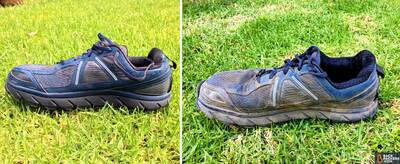
Left: Brand new Lone Peak 3.5, note the moderate cushion and reinforced toe box. Right: 210 miles later, still in good shape.
Conversely, my boyfriend, who hiked in an older model of the Pearl Izumi N2’s — which lack a rock guard and have a 4 mm drop — complained that rocks were poking him in the ball of the foot where his cushioning was the thinnest.
Durability
By the end of our JMT hike — roughly 210 miles of tough terrain — it was obvious to me that Altra has done a lot of work when it comes to the durability of the Lone Peak 3.5. The previous model, the Lone Peak 3, showed considerable wear around the toe box after a similar amount of mileage and terrain.
However, the Lone Peak 3.5 has a new, better constructed upper, which features strategically placed stitching around the widest part of the shoe. It looks like it will substantially surpass its predecessor when it comes to durability. I’d say these shoes are good for 500 miles or more of hiking over Sierra granite, and probably 600 miles on less gnarly terrain. All this with a backpack, mind you. If you’re really just trail running, they’ll probably go longer.
This shoe gets 5 stars in Durability, which is specific to trail running shoes. Know that it’s not a hiking boot, and simply won’t last as long.
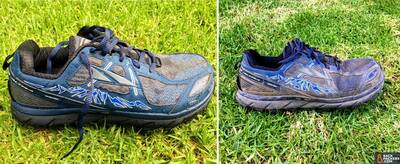
New on the left, travel-weary on the right. Not even that beat up after the JMT.
Soles
When crossing sketchy snow fields at 12,000 feet the last thing you want to worry about is the traction on your shoes. Lucky for me, Altra did all the worrying and gave the Lone Peak 3.5 some really burly lugs in their outsole.
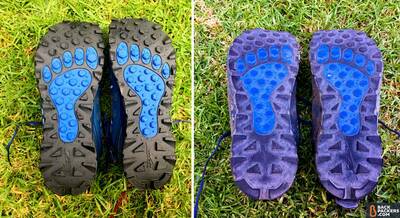
Soles arguably take the biggest beating, and these still ahd plenty of grip.
The sole uses MaxTrac Rubber with TrailClaw, and it provided excellent traction across everything the JMT had in store for me. Brands give fancy names to all their soles — this one grips well, which is all you need to know.
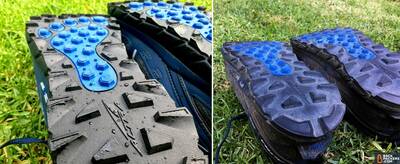
From this angle you can see a slight decline in the sharpness of the lugs, which means they did wear, but it’s a surprisingly small amount when you think about all the granite they walked on.
Uppers
The Lone Peak 3.5 has fixed the majority of the issues I had with the uppers on previous models. Additional stitching around the widest part of the shoe adds much needed durability, the tongue of the shoe no longer slips, and to top it all off, the shoes themselves look pretty good, which is not something that can be said for Altra’s other shoes, in my opinion.
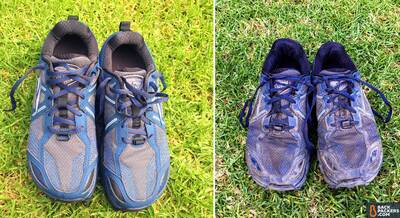
Left: Brand new Lone Peak 3.5. Right: some seriously used uppers after the JMT. While they look beat up, they haven’t ripped open and are highly functional.
Meanwhile the gaiter trap has been improved to a four point system, which worked wonders to keep my gaiters in place while thru hiking. There’s also new drainage holes in the shoe, which helped aid in the quest of keeping dirt and water out.
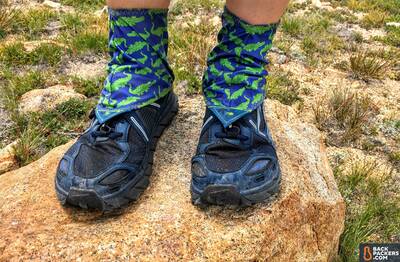
The 4-point gaiter trap makes sure dirt and dust don’t get in the top of your shoes.
Fit
I have really wide feet. It makes shoe buying a pain, and it’s one of the reasons I initially turned to Altra — in fact, my feet are so wide I used the men’s version of the Lone Peak 3.5. If you have very narrow feet then Altra may not be the shoe company for you. While many hikers swear by the FootShape toe box (capitalization according to the brand) and roomier design, there are some folks out there who aren’t a fan. C’est la vie — shoes are shoes, and they won’t fit everyone.
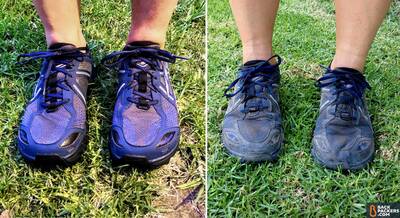
The extra-wide toe box helps feet splay fully.
With the Lone Peak 3.5, Altra has really started to dial in the fit, with a slightly wider toe box from the previous model, and a well-molded heel cup that keeps your heel locked into the shoe and prevents blisters. In this backpacker’s humble opinion, the 3.5 is the best version of the Lone Peak yet, and one of the best models of Altra shoes to come to market.
Trail Running vs Backpacking and Hiking
I actually found my way into Altra shoes because of trail running. As I started running more and more of my miles on the trail, I was looking for something that didn’t pinch my toes, had zero or minimal drop without having a minimalist stack height, and had really solid traction. As I transitioned from ultra runner to long distance backpacker, Altra shoes made the transition with me.
Grievances
For such a stellar shoe in adverse conditions there was not a lot to fault.
However, towards the latter half of our hike I noticed the rubber on the front of the Lone Peak 3.5 started to flap off. Granted, this is a pretty minor issue and can be remedied with a dab of shoe goo, but it was something I heard of other hikers having issues with as well.
Toe guards in the Sierras typically come loose due to all the granite, but it’s a point Altra might want to make stronger for the next iteration.
Final Word
I’m not going to be subtle here: the Altra Lone Peak 3.5 is my new favorite shoe. Any shoe that can go from unboxing to thru hiking with zero break in period is one worth taking note of.
Where to Buy Altra Lone Peak 3.5
We tested the Altra Lone Peak 3.5 men’s, even though our tester was a woman. This is due to her wide feet! There is an Altra Lone Peak 3.5 women’s, which is constructed in the same exact way, it just has a slightly different fit and sizes.
Altra also offers the Lone Peak 3.5 Neoshell, which is a water resistant version of the shoe. While this works for extremely wet and snowy environments, it’s a hot shoe, which is not what people usually want when looking for trail runners.
Compare Altra Lone Peak 3.5 men’s and women’s prices below.
Altra Lone Peak 3.5 Men's
-

 Amazon US
Amazon US$139.99$109.94See itAmazon.com Price: $109.94 (as of 07/24/2024 13:20 PDT) Details
Product prices and availability are accurate as of the date/time indicated and are subject to change. Any price and availability information displayed on Amazon.com at the time of purchase will apply to the purchase of this product.
-

 Zappos.com$139.95See it
Zappos.com$139.95See it
Altra Lone Peak 3.5 Women's
-

 Amazon US$134.86See it
Amazon US$134.86See itAmazon.com Price: $134.86 (as of 07/25/2024 07:35 PDT) Details
Product prices and availability are accurate as of the date/time indicated and are subject to change. Any price and availability information displayed on Amazon.com at the time of purchase will apply to the purchase of this product.
-

 Zappos.com$139.95See it
Zappos.com$139.95See it
